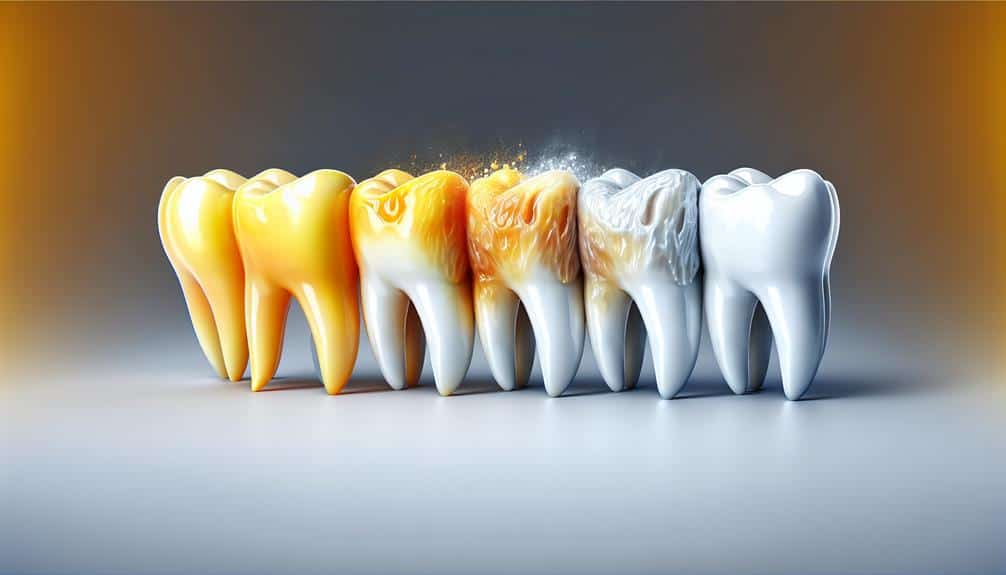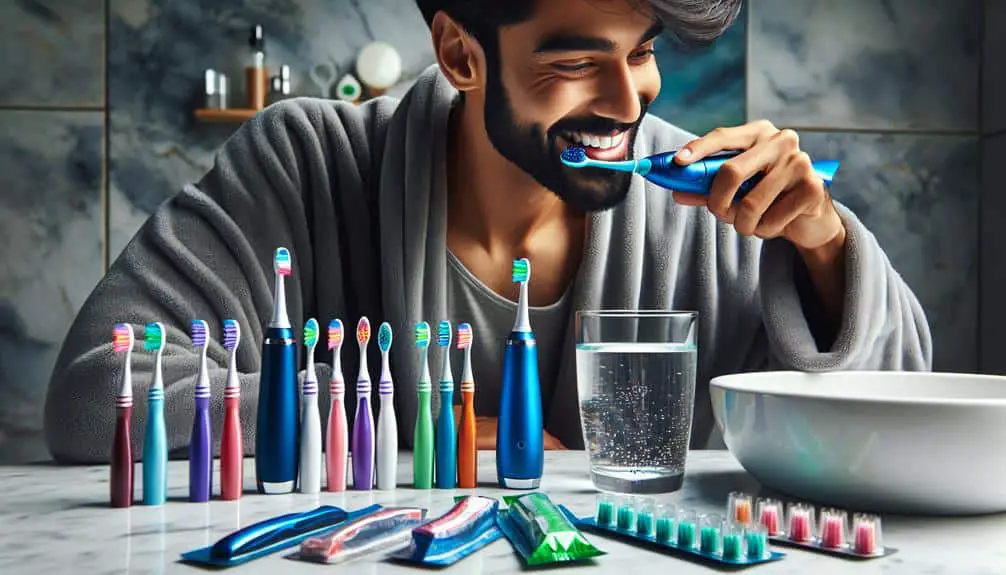If you've noticed your teeth discoloring after whitening, it's vital to maintain proper oral hygiene practices consistently. Keeping up with brushing your teeth twice daily with fluoridated toothpaste, flossing daily, using antiseptic mouthwash, and attending regular dental check-ups can help preserve the whitening results. Be mindful of staining foods and drinks like coffee, tea, and red wine, as well as sugary snacks that can lead to discoloration. Touch-up whitening sessions every 6 to 12 months and consulting with your dentist for personalized maintenance plans are critical.
Incorporating whitening toothpaste and mouthwash into your daily routine can also complement professional treatments. Understanding these factors will help you prolong the effects of whitening treatments and maintain a bright smile for longer.
Key Points
- Inadequate oral hygiene allows stains to accumulate and discolor teeth.
- Consuming staining foods and drinks can compromise the whitening results.
- Natural aging, genetics, and medications may contribute to discoloration over time.
- Enamel wear from acidic foods and poor dental habits can cause discoloration.
- Lack of regular touch-up whitening sessions leads to gradual discoloration reappearance.
Proper Oral Hygiene Practices
To maintain the brightness of your teeth post-whitening, it's important to adhere to proper oral hygiene practices consistently. Preventive measures play an essential role in preserving the results of teeth whitening procedures. Dental care should include brushing your teeth at least twice a day with a fluoridated toothpaste to remove plaque and prevent staining. Flossing daily is pivotal to remove food particles and plaque from between your teeth where your toothbrush may not reach effectively. Additionally, using an antiseptic mouthwash can help reduce bacteria in your mouth, promoting overall oral health and preventing discoloration.
Regular dental check-ups and professional cleanings are critical to make sure that your teeth and gums remain healthy. Your dentist can detect early signs of discoloration or staining and provide appropriate treatments to maintain your bright smile. By following these preventive measures and maintaining good dental care habits, you can prolong the effects of teeth whitening and keep your smile radiant.
Avoid Staining Foods and Drinks
Minimize the consumption of foods and beverages known to cause teeth staining to preserve the results of your whitening treatment. To maintain the effects of your whitening treatment and prevent discoloration, it's crucial to be mindful of what you eat and drink. Here are some items to avoid:
- Dark-colored beverages: Coffee, tea, and red wine can all contribute to staining teeth due to their intense pigmentation.
- Acidic foods: Citrus fruits and acidic drinks can erode the enamel, making it easier for stains to set in.
- Sugary snacks: Candies and sugary treats feed the bacteria in your mouth, leading to plaque buildup and discoloration.
Maintaining the results of your whitening treatment involves not only what you do but also what you avoid. By being conscious of your diet and making smart choices, you can help prevent discoloration and keep your smile bright for longer.
Regular Touch-Up Whitening Sessions
Consider scheduling regular touch-up whitening sessions to maintain the brightness of your smile over time. These sessions are crucial for teeth whitening maintenance and aid in discoloration prevention. As you go about your daily activities, your teeth are constantly exposed to staining agents from foods, drinks, and other environmental factors. Even with diligent care, discoloration can occur gradually. Touch-up whitening sessions can combat this by revitalizing the whiteness of your teeth and extending the longevity of your initial whitening treatment.
Typically, touch-up whitening sessions are recommended every 6 to 12 months, but this can vary based on individual habits and the whitening method used. These sessions are effective in preventing severe discoloration or the need for more intensive whitening treatments later on. By staying proactive with regular touch-up sessions, you can guarantee that your smile remains bright and vibrant for years to come. Remember, consistency in touch-up whitening is key to maintaining a dazzling smile and keeping discoloration at bay.
Consult With a Dentist
Engage in a discussion with your dentist regarding the best approach for addressing teeth discoloration after whitening. Seeking a dental consultation post-whitening can provide valuable insights and personalized recommendations. Here's how a professional consultation can help prevent discoloration with expert advice:
- Assessment of Whitening Results: Your dentist can evaluate the current shade of your teeth post-whitening to determine the extent of discoloration and recommend suitable solutions.
- Customized Maintenance Plan: Receive a personalized plan for maintaining your whitened teeth, which may include specific oral care routines and products tailored to your needs.
- Professional Guidance on Discoloration Prevention: Benefit from expert advice on lifestyle habits, dietary choices, and additional treatments that can help prevent or minimize future discoloration issues.
Use Whitening Toothpaste and Mouthwash
To enhance the effects of whitening techniques and maintain a bright smile, incorporate whitening toothpaste and mouthwash into your daily dental care routine. Whitening toothpaste often contains gentle abrasives or polishing agents that help remove surface stains on your teeth, revealing a brighter smile over time. When used consistently, these toothpastes can complement the effects of professional whitening treatments by preventing new stains from forming.
Whitening mouthwashes, on the other hand, typically contain hydrogen peroxide or other whitening agents that can help lighten tooth discoloration. Using a whitening mouthwash after brushing can reach areas that may be missed by toothpaste alone, providing a more thorough approach to maintaining a white smile.
It's important to note that while whitening toothpaste and mouthwash can be effective in enhancing and maintaining the results of whitening treatments, they may not provide dramatic whitening effects on their own. Consistency in using these products as part of your daily dental care routine is key to achieving and preserving a bright, white smile.
Frequently Asked Questions
Can Teeth Whitening Cause Sensitivity or Pain in the Teeth?
Teeth whitening can indeed cause sensitivity or pain in your teeth. To manage sensitivity, use desensitizing toothpaste. Prevent pain by avoiding extremely hot or cold foods and drinks. Consult your dentist for personalized advice.
How Long Does the Whitening Effect Typically Last Before Needing Touch-Up Sessions?
To maintain your whitened smile, consider touch-up sessions every 6-12 months. The longevity of whitening results varies based on habits like diet and oral care. Regular touch-ups can help sustain your bright smile over time.
Are There Any Natural Remedies or DIY Methods to Whiten Teeth at Home?
Looking to brighten your smile at home? Explore natural remedies like baking soda or hydrogen peroxide for cost-effective teeth whitening. DIY methods using charcoal or oil pulling are herbal options for a radiant smile.
Can Certain Medications or Medical Conditions Affect the Results of Teeth Whitening Treatments?
Certain medical conditions and medications can indeed affect the outcome of teeth whitening treatments. Factors like lifestyle choices and diet also play a role. It's important to consult with your healthcare provider before undergoing whitening procedures to guarantee ideal results.
Is It Safe to Use Charcoal Toothpaste or Other Trendy Whitening Products?
When considering trendy whitening products like charcoal toothpaste, it is essential to evaluate their effectiveness and safety. While these products may promise quick results, potential risks such as enamel damage should be carefully weighed before use.




